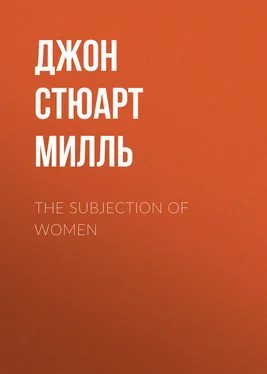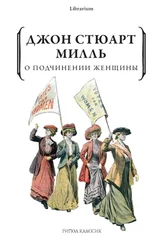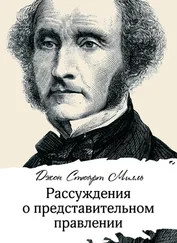Джон Милль - The Subjection of Women
Здесь есть возможность читать онлайн «Джон Милль - The Subjection of Women» — ознакомительный отрывок электронной книги совершенно бесплатно, а после прочтения отрывка купить полную версию. В некоторых случаях можно слушать аудио, скачать через торрент в формате fb2 и присутствует краткое содержание. Жанр: Философия, literature_19, foreign_antique, foreign_prose, на английском языке. Описание произведения, (предисловие) а так же отзывы посетителей доступны на портале библиотеки ЛибКат.
- Название:The Subjection of Women
- Автор:
- Жанр:
- Год:неизвестен
- ISBN:нет данных
- Рейтинг книги:4 / 5. Голосов: 1
-
Избранное:Добавить в избранное
- Отзывы:
-
Ваша оценка:
- 80
- 1
- 2
- 3
- 4
- 5
The Subjection of Women: краткое содержание, описание и аннотация
Предлагаем к чтению аннотацию, описание, краткое содержание или предисловие (зависит от того, что написал сам автор книги «The Subjection of Women»). Если вы не нашли необходимую информацию о книге — напишите в комментариях, мы постараемся отыскать её.
The Subjection of Women — читать онлайн ознакомительный отрывок
Ниже представлен текст книги, разбитый по страницам. Система сохранения места последней прочитанной страницы, позволяет с удобством читать онлайн бесплатно книгу «The Subjection of Women», без необходимости каждый раз заново искать на чём Вы остановились. Поставьте закладку, и сможете в любой момент перейти на страницу, на которой закончили чтение.
Интервал:
Закладка:
If this general principle of social and economical science is not true; if individuals, with such help as they can derive from the opinion of those who know them, are not better judges than the law and the government, of their own capacities and vocation; the world cannot too soon abandon this principle, and return to the old system of regulations and disabilities. But if the principle is true, we ought to act as if we believed it, and not to ordain that to be born a girl instead of a boy, any more than to be born black instead of white, or a commoner instead of a nobleman, shall decide the person's position through all life – shall interdict people from all the more elevated social positions, and from all, except a few, respectable occupations. Even were we to admit the utmost that is ever pretended as to the superior fitness of men for all the functions now reserved to them, the same argument applies which forbids a legal qualification for members of Parliament. If only once in a dozen years the conditions of eligibility exclude a fit person, there is a real loss, while the exclusion of thousands of unfit persons is no gain; for if the constitution of the electoral body disposes them to choose unfit persons, there are always plenty of such persons to choose from. In all things of any difficulty and importance, those who can do them well are fewer than the need, even with the most unrestricted latitude of choice: and any limitation of the field of selection deprives society of some chances of being served by the competent, without ever saving it from the incompetent.
At present, in the more improved countries, the disabilities of women are the only case, save one, in which laws and institutions take persons at their birth, and ordain that they shall never in all their lives be allowed to compete for certain things. The one exception is that of royalty. Persons still are born to the throne; no one, not of the reigning family, can ever occupy it, and no one even of that family can, by any means but the course of hereditary succession, attain it. All other dignities and social advantages are open to the whole male sex: many indeed are only attainable by wealth, but wealth may be striven for by any one, and is actually obtained by many men of the very humblest origin. The difficulties, to the majority, are indeed insuperable without the aid of fortunate accidents; but no male human being is under any legal ban: neither law nor opinion superadd artificial obstacles to the natural ones. Royalty, as I have said, is excepted: but in this case every one feels it to be an exception – an anomaly in the modern world, in marked opposition to its customs and principles, and to be justified only by extraordinary special expediencies, which, though individuals and nations differ in estimating their weight, unquestionably do in fact exist. But in this exceptional case, in which a high social function is, for important reasons, bestowed on birth instead of being put up to competition, all free nations contrive to adhere in substance to the principle from which they nominally derogate; for they circumscribe this high function by conditions avowedly intended to prevent the person to whom it ostensibly belongs from really performing it; while the person by whom it is performed, the responsible minister, does obtain the post by a competition from which no full-grown citizen of the male sex is legally excluded. The disabilities, therefore, to which women are subject from the mere fact of their birth, are the solitary examples of the kind in modern legislation. In no instance except this, which comprehends half the human race, are the higher social functions closed against any one by a fatality of birth which no exertions, and no change of circumstances, can overcome; for even religious disabilities (besides that in England and in Europe they have practically almost ceased to exist) do not close any career to the disqualified person in case of conversion.
The social subordination of women thus stands out an isolated fact in modern social institutions; a solitary breach of what has become their fundamental law; a single relic of an old world of thought and practice exploded in everything else, but retained in the one thing of most universal interest; as if a gigantic dolmen, or a vast temple of Jupiter Olympius, occupied the site of St. Paul's and received daily worship, while the surrounding Christian churches were only resorted to on fasts and festivals. This entire discrepancy between one social fact and all those which accompany it, and the radical opposition between its nature and the progressive movement which is the boast of the modern world, and which has successively swept away everything else of an analogous character, surely affords, to a conscientious observer of human tendencies, serious matter for reflection. It raises a primâ facie presumption on the unfavourable side, far outweighing any which custom and usage could in such circumstances create on the favourable; and should at least suffice to make this, like the choice between republicanism and royalty, a balanced question.
The least that can be demanded is, that the question should not be considered as prejudged by existing fact and existing opinion, but open to discussion on its merits, as a question of justice and expediency: the decision on this, as on any of the other social arrangements of mankind, depending on what an enlightened estimate of tendencies and consequences may show to be most advantageous to humanity in general, without distinction of sex. And the discussion must be a real discussion, descending to foundations, and not resting satisfied with vague and general assertions. It will not do, for instance, to assert in general terms, that the experience of mankind has pronounced in favour of the existing system. Experience cannot possibly have decided between two courses, so long as there has only been experience of one. If it be said that the doctrine of the equality of the sexes rests only on theory, it must be remembered that the contrary doctrine also has only theory to rest upon. All that is proved in its favour by direct experience, is that mankind have been able to exist under it, and to attain the degree of improvement and prosperity which we now see; but whether that prosperity has been attained sooner, or is now greater, than it would have been under the other system, experience does not say. On the other hand, experience does say, that every step in improvement has been so invariably accompanied by a step made in raising the social position of women, that historians and philosophers have been led to adopt their elevation or debasement as on the whole the surest test and most correct measure of the civilization of a people or an age. Through all the progressive period of human history, the condition of women has been approaching nearer to equality with men. This does not of itself prove that the assimilation must go on to complete equality; but it assuredly affords some presumption that such is the case.
Neither does it avail anything to say that the nature of the two sexes adapts them to their present functions and position, and renders these appropriate to them. Standing on the ground of common sense and the constitution of the human mind, I deny that any one knows, or can know, the nature of the two sexes, as long as they have only been seen in their present relation to one another. If men had ever been found in society without women, or women without men, or if there had been a society of men and women in which the women were not under the control of the men, something might have been positively known about the mental and moral differences which may be inherent in the nature of each. What is now called the nature of women is an eminently artificial thing – the result of forced repression in some directions, unnatural stimulation in others. It may be asserted without scruple, that no other class of dependents have had their character so entirely distorted from its natural proportions by their relation with their masters; for, if conquered and slave races have been, in some respects, more forcibly repressed, whatever in them has not been crushed down by an iron heel has generally been let alone, and if left with any liberty of development, it has developed itself according to its own laws; but in the case of women, a hot-house and stove cultivation has always been carried on of some of the capabilities of their nature, for the benefit and pleasure of their masters. Then, because certain products of the general vital force sprout luxuriantly and reach a great development in this heated atmosphere and under this active nurture and watering, while other shoots from the same root, which are left outside in the wintry air, with ice purposely heaped all round them, have a stunted growth, and some are burnt off with fire and disappear; men, with that inability to recognise their own work which distinguishes the unanalytic mind, indolently believe that the tree grows of itself in the way they have made it grow, and that it would die if one half of it were not kept in a vapour bath and the other half in the snow.
Читать дальшеИнтервал:
Закладка:
Похожие книги на «The Subjection of Women»
Представляем Вашему вниманию похожие книги на «The Subjection of Women» списком для выбора. Мы отобрали схожую по названию и смыслу литературу в надежде предоставить читателям больше вариантов отыскать новые, интересные, ещё непрочитанные произведения.
Обсуждение, отзывы о книге «The Subjection of Women» и просто собственные мнения читателей. Оставьте ваши комментарии, напишите, что Вы думаете о произведении, его смысле или главных героях. Укажите что конкретно понравилось, а что нет, и почему Вы так считаете.











